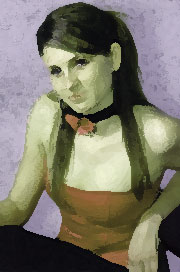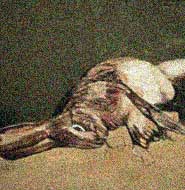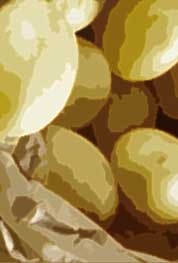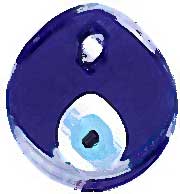|
|
|
|
|
|
|
|
|
|
|
|
|
|
|
|
|
|
|
|
|
 Anne Germanacos Anne GermanacosFate Russian Hostesses Ever since bad luck struck his older son down, Aristides liked to watch it devour other peoples' lives. He scoured the Friday obituaries gleefully, followed every tragedy in the papers. If Christos bought the cantina on the beach from Mihalis and kept it as a sandwich stand by day but turned it into a bar with Ukrainian hostesses at night, families would break apart like the cheap white china plates that people smashed for fun in the bouzouki clubs. "Eh... eh... eh... everyone knows it." Calm or fierce, Aristides stuttered when he spoke. "She'll try to kkkkkkkk... kill him if he goes near those women!" His first cousin Yakovos had been the wildest boy in the village. Now no longer a boy, he was still wild. The cousins' houses abutted; their bedroom windows were bridged by three meters of air. Aristides' wife Irini put a big plate of boiled greens on the table for herself and Aristides to share. She left some in the pot for Yannis, now their only son. They visited Kyriakos at his grave every evening at dusk. Most days now she remembered not to set his place at the table. Aristides had collected the greens on the mountain. It was spring — the fennel and wild dandelion were plentiful. Irini poured deep green olive oil and squeezed lemon. Two pinches of of sea salt. The tiny fish, marida, were still frying in the pan. She opened the window and they heard Yakovos' wife Aristea screaming at her young son from the next house. The sound was close, the words were clear‹Aristea was always yelling at her children. "I'm going to slaughter you!" Last August, long after midnight, Irini awakened to hear furniture being overturned in their cousins' house. Plates and glasses smashed against the bare marble floor. She heard Aristea's high-pitched shrieks and knew the children were asleep. Aristides slept through anything, but that night she nudged him awake. They lay against hot sheets arguing over what to do. Finally, he put on his clothes, walked out of his house, down the alley, and up the stairs of his cousin's house. He stood at the door without knocking. Finally the noise stopped. He went home. The air between the houses was thick and still. Each man turned to his wife; the beds rocked. Now, in the steamy kitchen, the fish was crisp and hot. Aristides put the whole three-inch fish in his mouth, chewed the bones as well as the head. She opened each one at the belly, tore flesh away from the delicate spine. As he chewed, he thought about a bar on the beach brimming with Russian prostitutes. Red-lipped ones with floppy blond hair. "Iiiii... iiii... it will be the end of my cousin. And others too. This little village will blow itself to pppppp... pieces." Since that hot summer night of broken dishes and screaming, Aristea flicked her eyes away from Irini's whenever they passed on the road. Irini forked up a mass of greens shaded dark by the boiling water. In her mouth was the subtlest burst of earth and leaf. She wondered if her boy had ever been with a girl. Not a Russian putana but a pretty girl his own age with supple flesh. Their forks tangled in the greens. His smile showed small white teeth; hers indicated darkened bone with space between. "I never worry about prostitutes," she said. He had watched one of those porcelain-faced girls at work; he knew exactly how far his cousin had to fall. Lanade
Aristides was kneeling on sharp rocks, preparing to shoot a dead rabbit full of Lanade. The evening was cool, late May. He tucked his wild black and gray beard into his dark shirt. He tried to keep his nostrils closed while he mixed the pale yellow powder with water, sucked it into the syringe and squirted it slowly into the almost-solid flesh of the rabbit. A male. He wanted to poison the ravens that flew off with the goose eggs. The smell of it hurt his nostrils, churned his stomach. His son Yannis arrived on his bike. He was already taller than his older brother had been when he died, a year before. Lean and good-looking, he was just fifteen years old. "Hey! I'm ddddddd..doctoring up this rabbit a bit. Did you see that? A little twtwtwtw... twitching in the hind quarters." "Are you crazy, Dad? That rabbit is deader than dead." Yannis leaned down, looked a little more closely, came up again swiftly, dodging the smell. "What are you doing to that thing Dad?" "I'm just doctoring it up some." Aristides chuckled. Yannis left his bike and took long strides on the rocky path away from his father. He passed beneath a forest of dry bougainvillea petals, hit loose branches away with his fists. His father didn't know shit about the world, nothing at all. The kind of nothing that knocked a hole in you, sucked you dry. Sometimes he couldn't help picturing his dead brother laid out in his coffin on the dining room table. The scent had been putrid‹decaying flesh and hot wilted flowers. His brother's face was bruised yellow and purple, criss-crossed by hurriedly sewn thick black stitches. He walked all the way out toward the sea and back, saw the girls from his class on the way down and the way up, nodded both times, wondered why they were always giggling. From across two fields of leafy grape vines, he heard his father laughing to himself. Returning, Yannis heard his father's breath leave his mouth as he heaved the cyanide-stuffed rabbit into the next field, bait for the circling ravens. He preferred their long-fingered caws to the hissing geese. Who would eat those putrid-smelling eggs anyway? Aristides' beard was still stuffed down his shirt when Yannis found him balanced on sharp rocks, cackling in raucous abandon. Only in laughter did his stutter disappear. Sister
Irini left the white roots covered in water and a little salt to keep away the black spots. Her potatoes were always blemishless. Her son's skin had been otherwise, greasy in parts, around the nose, on the fold between chin and mouth, forehead. In death, the skin was mottled yellow and there'd been a white plastic crown on his head to show that he'd never been married. On his face were awkward black stitches. At the graveyard, the awkwardness of his full-sized man's body set the pallbearers against their own weight: they lost control and the flowers fell away. Irini was spared the sight of his naked yellow feet but the villagers talked — those damn city undertakers hadn't bothered to put on the good black shoes, purchased for that very purpose. She knew that in his grave, the insect world was always famished and busy. She dropped handfuls of cut potatoes into the pot of boiling olive oil. In the road, she heard Aristides' truck turn in. Engine shut off abruptly. The kitchen was steamy despite open windows and the gaping front door. He walked in, his hair and beard neat, trimmed, under control. Without the hair, he was older but no longer ancient. Her shy smile let the secret pass between them. Wind came through the window, blew the lace curtains into the room. He had a kilo of fresh barbouni in a bag. In the afternoon they would take the white-washed path past flowers they would cut and place on the grave. Two painted white urns were glued onto the iconostasis above the marble, one above each shoulder. Aristides would cry. Today his face was clean of the beard he had worn for a little over a year; she thought he must know exactly what they would tell the remaining boy, Yannis. When the school bus stopped in the square, Yannis got off with the others. At home, he found his filled plate on the table. His jaw was lean, his back long and hunched with new burdens. He ate his potatoes while they watched him, as if hungry for signs. His parents sat so close to one another it was as if they shared a single chair. "What?!" Yannis couldn't stand being watched — the girls were always watching him. Finally he took in his father's face — new, fresh, older. "Me yeia, baba." After haircuts, boys hit each other on the clean-shaven neck and said, "with health." He forked up another catch of french fries. The fact of his father's newly shorn head and clean face made him realize their secret: he was astonished. For a moment, no words passed between them but while they waited, the pale yellow room took on another texture. The air thickened; objects came at him in waves. "It's a girl," his parents said at the exact same time. They looked at one another, about to giggle. He left the room in a hurry, jumped down the white marble stairs two at a time. Before he had time to know where he was going, he found himself at the gravesite. He put a hand on each of the plastic doves. Erofili, one of the girls from school, stood by the white-washed stone wall. He wondered if she was waiting for him. When tears came, he didn't bother to wipe them away. Fruit Flies
I was driving back from the crossroads with an open pig bucket in the trunk, Greek and English newspapers and an exorbitant phone bill. Fruit flies stormed and swirled through the car despite four open windows. In front of the all-male cafeneion, a thin old man flagged me down. I slowed, looked out expectantly through the cloud of flies. "Can you take me up the road?" I leaned over and released the doorcatch for him. He carried a clear plastic bag containing something wrapped in newspaper. "Do you have some fish there?" "No, no. It's soft drinks. Gazozes." His body was narrow and didn't take up much room on the seat. He had small black eyes and thick grey hair. He spoke with a flourish. I knew that he was the Bishop's brother. There was something wrong with his brain. "Are you by any chance passing by the monastery?" "Right on my way. The season is heating up." "It does appear to be doing so." He looked at my legs in their shorts. I couldn't remove them from the pedals. Up ahead, the narrow road was jammed by a tourist bus. Older men and women streamed past, jabbering in their own languages. "Pagans, all of them." I didn't answer. He asked me where I was from and offered that he had a son in America. "I myself have visited five times. Chicago, Astoria, Pennsylvania." The car hummed on the road beneath dusty pine trees. The bus manoeuvred through the straits and drove on. I stopped at the door of the pale orange three hundred year-old building. He sat there as if unable to decide to leave. Both hands held the small bag. "Do you have children?" he asked. "Yes, two." I thought he would say, na sas zisoune, may they live for you. Then, I expected, he would open the door and go into the monastery where he would eat a meager meal with his brother the Bishop. Most of the fruit flies had cleared away from the front of the car. There was a haze of them in the rear window. "And might I ask if they are baptized?" "They're fine, thank you," I said then leaned across his lean belly and pulled the door open. "Have a good lunch. Enjoy it," I said. Outside the car, he was obsequious. "Many thanks, thank you very much. Go with God," he said, almost bowing. Then he turned and stumbled across uneven three-hundred-year-old stones. Like my husband, he swam in all seasons. But that wasn't why they said he was crazy. I drove away quickly, my legs ungazed upon. My children were halfway across the world. I thought about them greedily. Just before the acutely tapered road beneath the overhanging boulder, I performed a mental christening, dunked each huge boy chastely covered with an opaque garment into a vat of water. The car was all plastic and metal. I rapped twice on my head, wood, to dispel the evil eye. |